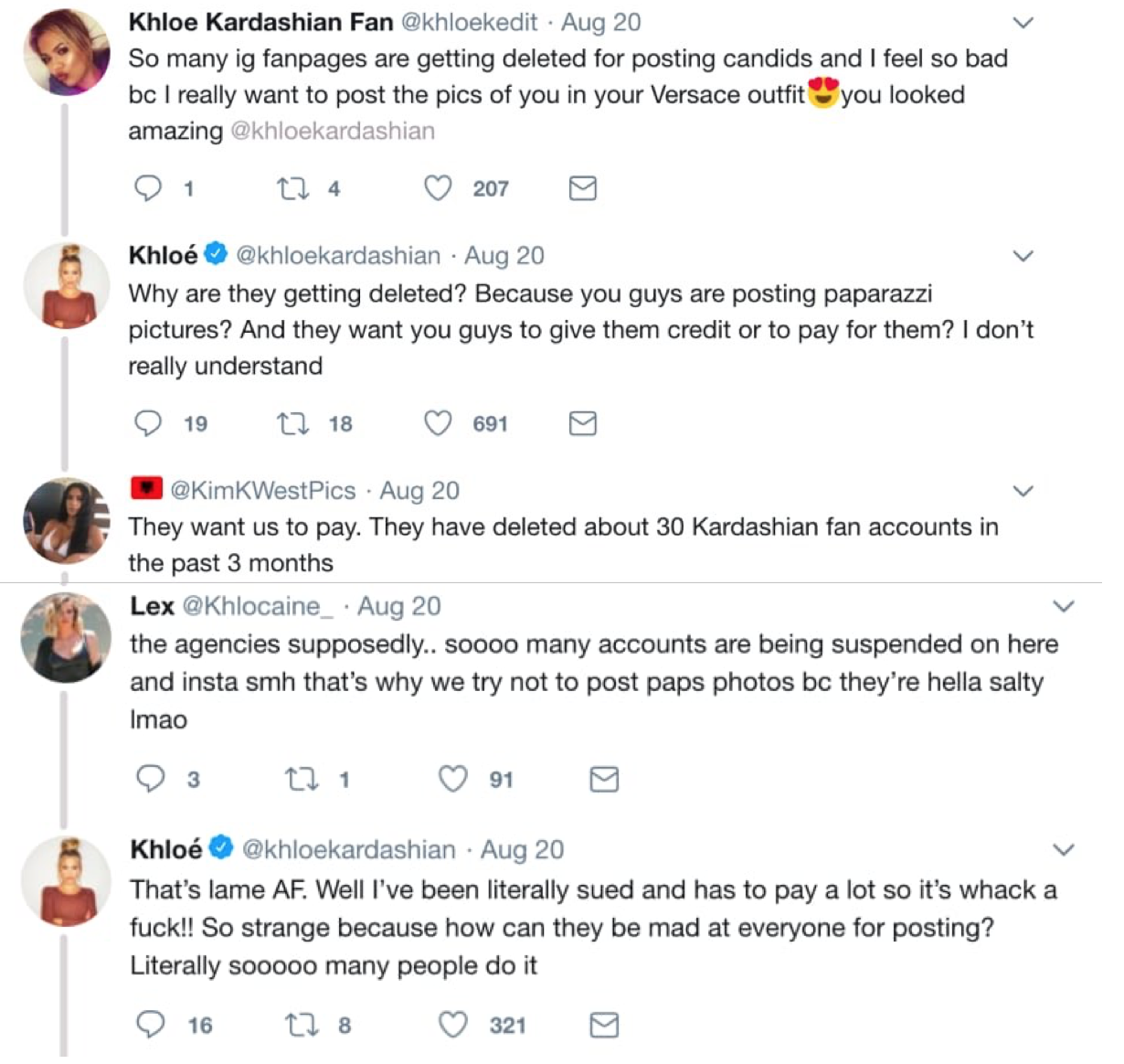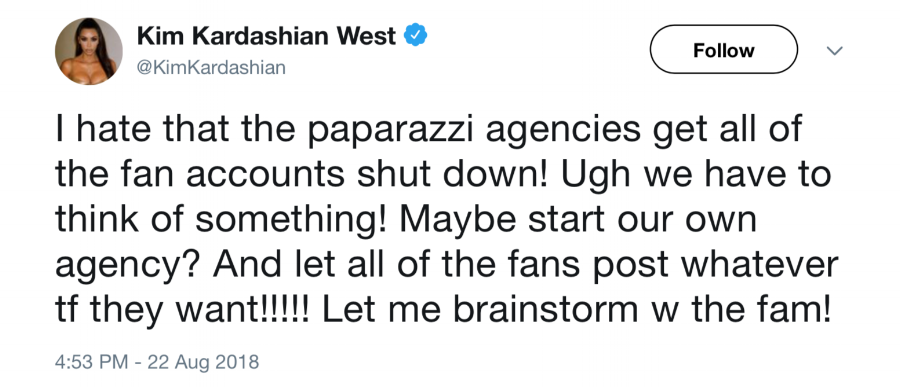In April 2017, Khloe Kardashian was named in a copyright infringement lawsuit after posting a photo of herself on her Instagram account. According to the since-settled lawsuit, which was filed by Xposure Photos in a California federal court, the reality television star ran afoul of federal copyright law by posting a photo of herself “going for a meal at David Grutman’s Miami restaurant, Komodo” without licensing the photo from Xposure, the copyright holder.
The London-based celebrity photo firm alleged in its lawsuit that “the photograph was … licensed for limited use to The Daily Mail [and] contained copyright management information … in the form of a copyright notice stating ‘© XPOSUREPHOTOS.COM.’” Xposure claimed that after The Daily Mail published the photo, Khloe Kardashian posted it on her Instagram account, without obtaining permission from Xposure, but not before “removing the [copyright management information] showing plaintiff as the copyright owner of the image.”
Xposure asserted that “the photograph is highly valuable,” at least in part “because of Kardashian’s celebrity status,” and as a result, “Xposure (and the photographer it represents) stood to gain licensing revenue from licensing the photograph, but [Kardaashian’s] unauthorized use” of the image – which Xposure claims was commercial in nature since “Kardashian uses her Instagram feed for the purposes of promotion, specifically, to promote her own business interests, products, and ventures” – harms “the existing and future market for the original photograph.”
By posting the photo without a license, Xposure alleged that Kardashian infringed the copyright, and sought monetary damages, as well as preliminary and permanent injunctive relief, which would bar Kardashian from posting the infringing photo.
How Copyright Law Works
For the uninitiated, copyright law protects “original works of authorship,” including photographs. The holder of a copyright – which in the case of photos is usually the photographer (unless he/she assigns that right to another party) – has the exclusive right to reproduce, distribute, perform, display, license, and to prepare derivative works based on the copyrighted work for his entire life and for 70 years after his death.
Applied to the Xposure v. Kardashian case, this means that even though the photo is of Khloe Kardashian, since she is not the copyright holder, she cannot legally post it without authorization from the copyright holder, i.e. Xposure. (Note: It is a widely-spread falsity that if a photo is credited that it is not infringing; infringement occurs with a photo is used without authorization, regardless of whether the individual posting them image credited the copyright holder or not).
Kardashian says that following the lawsuit, she has taken to licensing the photos of herself that she posts on her social media account. Her and her sisters’ fan accounts are not doing the same, though, as first reported by Buzzfeed, and as a result, a number of Instagram accounts have been suspended by the Facebook-owned platform following its receipt of copyright infringement reports from the agencies and photographers that own the photos.
 image: Twitter
image: Twitter
The famous sisters said in a number of recent tweets that they are thinking of ways around this, but in the meantime, Instagram account @FairUseFans has started a change.org petition, claiming that the copyright infringement defense of fair use applies to fan accounts.
According to the petition, “Many examples of when Fair Use is applied include the millions fan and fashion accounts posting paparazzi photos on Instagram who have recently been disabled due to violation of the original owners copyrights.”
While fair use – which refers to the reproduction of copyright-protected material for a limited and “transformative” purpose – is one of the most common exceptions or defenses to copyright infringement, it is hardly a guarantee that it the doctrine with protect the fan accounts at issue.
Primarily, a fair use analysis would take into account the purpose/nature of the use, namely, whether or not the use is transformative, meaning that it “adds something new, with a further purpose or different character, and does not merely substitute for the original use of the work.”
The U.S. Copyright Office notes that uses, “such as criticism, comment, news reporting, teaching, scholarship, and research,” are typically “examples of activities that may qualify as fair use.” The Copyright Office has further stated that “courts look at how the party claiming fair use is using the copyrighted work, and are more likely to find that non-profit educational and non-commercial uses are fair.” Still yet, courts will examine how much of the original work is embodied in the subsequent use, and the risk of market harm.
“Courts evaluate fair use claims on a case-by-case basis, and the outcome of any given case depends on a fact-specific inquiry,” per the Copyright Office. “This means that there is no formula to ensure that a predetermined percentage or amount of a work—or specific number of words, lines, pages, copies—may be used without permission.”
In short: It is not nearly as simple as claiming “Fair Use!” and dodging copyright infringement liability.
What About the Right of Publicity?
Copyright law aside, the question remains whether there is a larger right of publicity case to be made against photo agencies/paparazzi more generally.
The right of publicity, a state-specific legal doctrine developed to give individuals the ability to prevent others from exploiting their names and/or likeness without permission, “prevents the unauthorized commercial use of an individual’s name, likeness, or other recognizable aspects of one’s persona.”
Such a suit would not be the first of its kind. Early this year, for instance, football star Odell Beckham Jr., filed suit against photographer Miles Diggs and California-based Splash News & Picture Agency for allegedly attempting to “extort” him into paying $40,000 after he posted a photo of himself on his Instagram account. “The audacity of Splash News to demand payment from Beckham – the very person who provided value to the Photos – is shocking, reeks of bad faith, and emphasizes the utterly troll-ish behavior of Diggs and Splash,” the complaint asserts.
Beckham alleges that Diggs sold or licensed the images to Splash, which then licensed them to a variety of gossip websites, including TMZ, and DailyMail.com, in exchange for a royalty fee. However, “The only reason that the photos have any value is because they depict Beckham,” according to the complaint. “Yet, Beckham received no compensation from Diggs or Splash.”
In his suit, the New York Giants wide receiver has asked the court hold that he has not violated copyright law,” and that in fact, it is Splash that is in the wrong, for violating his right of publicity by “exploiting [his] image for personal financial gain.”
That case, Beckham v. Splash News and Picture Agency, LLC et al, 2:18-cv-01001 – which is undoubtedly murky given the newsworthiness/public interest elements at play, along with the large-scale benefits that celebrities tend to gain from the relevance that comes with paparazzi coverage – is still underway in a federal court in Louisiana.








